Department of English
UCMLA Conference
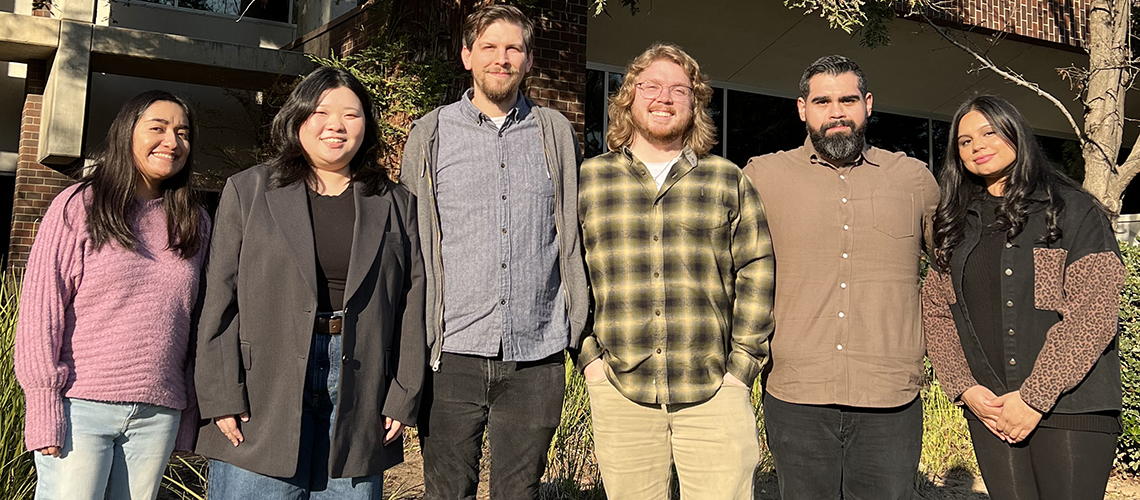
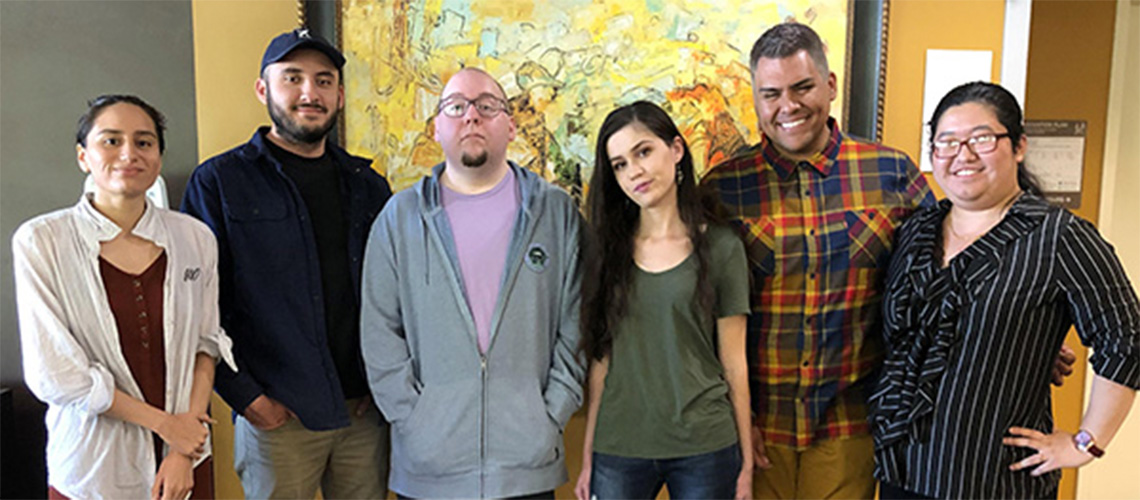
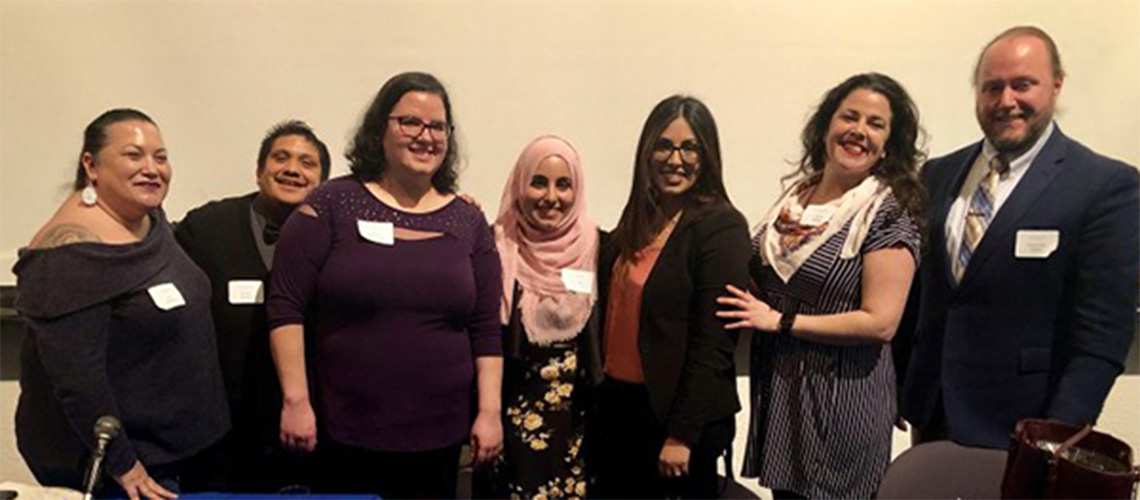
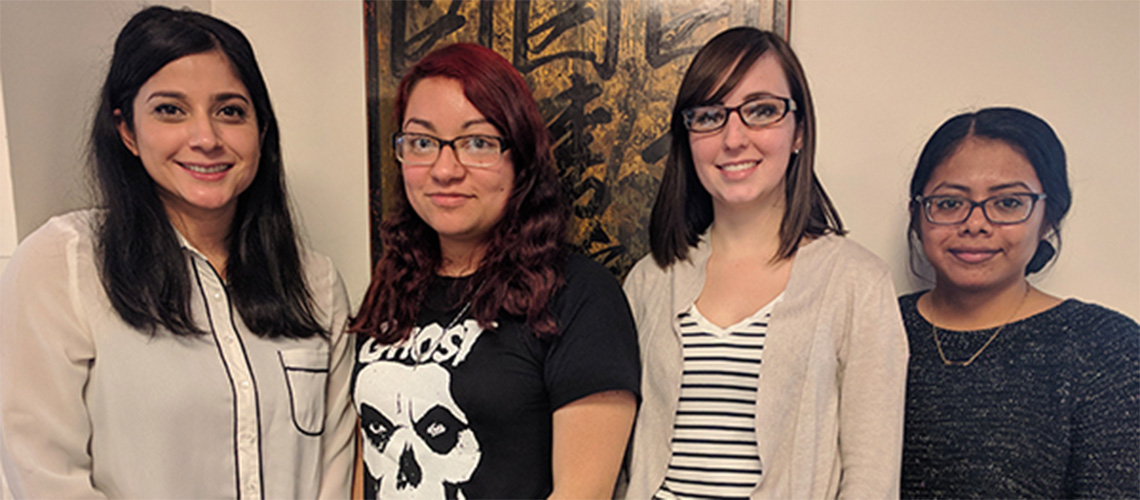
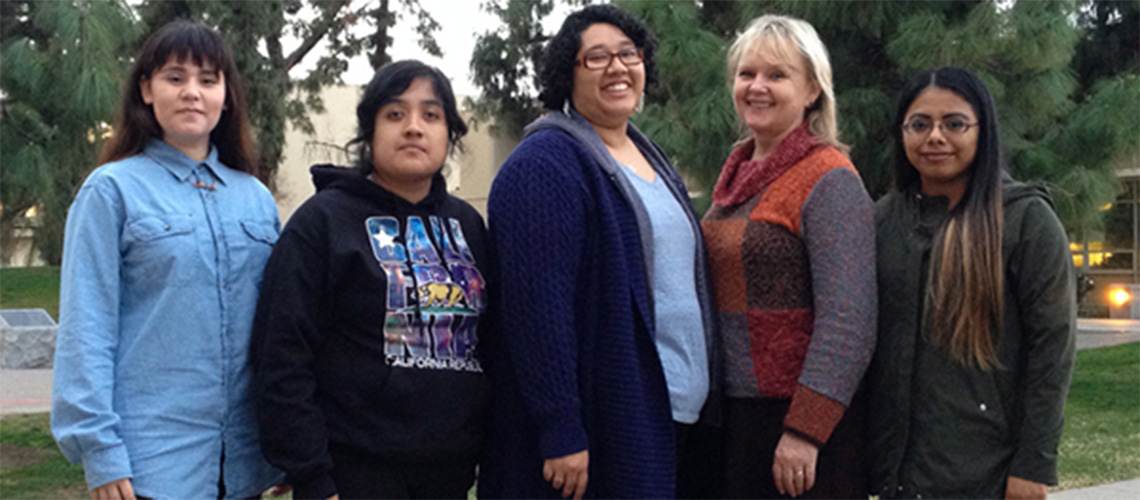
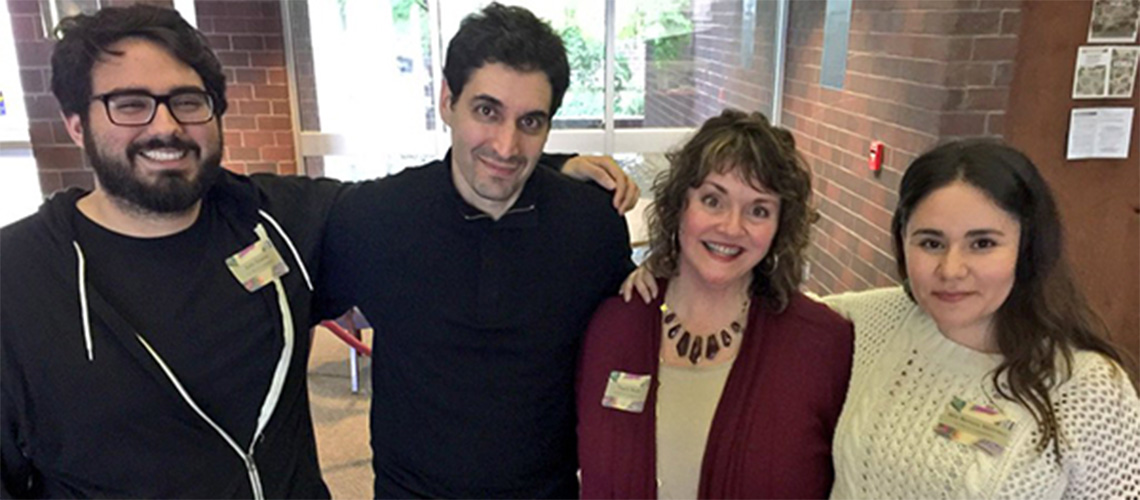
Undergraduate Conference on Multiethnic Literatures of the Americas
California State University, Fresno
17th annual conference: Friday, March 13, 2026
Location: University Business Center on campus
Featured Speakers
To be announced!
About the Conference
Founded in 2010, UCMLA has featured more than 100 undergraduate student presenters.
The Undergraduate Conference on Multiethnic Literatures of the Americas was founded in 2010 to provide undergraduate students with a professional venue in which to present their research and to foreground the increasingly significant study of multiethnic literatures, particularly the interconnectedness of those literatures across cultures, nations, and languages.
Undergraduate students gain experience in writing abstracts, presenting papers, and engaging in scholarly debate and discussion. The presentation of their research also serves to enhance the curriculum of Fresno State’s English Department.
The conference is organized by the department’s graduate students and faculty advisers.
In 2017, the 8th annual UCMLA conference was dedicated to the memory of Mireyda "Mia" Barraza Martinez and opened with a tribute to her.
Mia was a beloved student, scholar, poet, and activist who believed deeply in the UCMLA mission. As an undergraduate, she presented papers on Wendy Rose (2013) and Andrés Montoya (2014). As a graduate student, she volunteered her time and talent to design the conference programs, and she served on the conference organizing committee in 2015 and 2016.
Mia died in a car accident in November 2016, one semester away from graduating with her MFA in creative writing. She was 29. Her MFA was awarded posthumously.
2025 — Talia Lakshmi Kolluri and lawrence-minh bùi davis
2024 — Sandra Cisneros and Jesse Alemán
2023 — Shadab Zeest Hashmi and LeiLani Nishime
2022 — Amparo Ortiz and Rajini Srikanth
2021 — Gerald Vizenor and Monica De La Torre
2020 — Erika L. Sánchez and Ishmael Reed
2019 — Maxine Hong Kingston and Elda María Román
2018 — Reyna Grande and Gary Y. Okihiro
2017 — Wendy Rose and Arturo Arias
2016 — Saïd Sayrafiezadeh and Michele Elam
2015 — Manuel Muñoz and Marilyn Chin
2014 — Roxane Gay
2013 — Samiya Bashir
2012 — Hayan Charara and Jorge Huerta
2011 — Cherrie Moraga
Call for Papers
Deadline to submit: January 26, 2026.
This conference focuses on the multiethnic literatures of North America, South America, Central America, and the Caribbean. Students from any major may submit abstracts. We encourage analytical papers on any thematic or formal aspect of a text or group of texts, including film and other cultural productions. The argument should illuminate the work(s) in original ways while drawing on available scholarship to make its case.
We invite current undergraduate students and those who have graduated within the past year, as well as first-year graduate students, to submit a 250-word abstract (summary) of their papers. Students whose abstracts are accepted will present their papers at the conference.
We hope that by presenting at the conference or attending some of the panel discussions, many undergraduates will find themselves interested in the possibility of graduate school and that many others will discover the rewards of being part of a community of scholars.
Deadline for submission of your 250-word abstract is Monday, Jan. 26, 2026.
Submit your abstract to the UCMLA committee by email either uploaded as a Word document or copied and pasted in the body of the email.
For further details, please see the FAQs tab and our sample abstract.
Need help with your abstract? You can view our sample abstract. The UCMLA committee also offers the following opportunities.
Workshop on writing abstracts:
4 to 5 PM on Friday, January 24, 2025 inside the Fresno State Library media viewing room (LIB 3126).
Faculty and graduate students will be available to provide advice and guidelines for writing abstracts, to answer questions, and to provide examples.
Early submission of drafts of abstracts:
If you submit a draft of your abstract by email by Monday, Jan. 6, 2025, you will receive feedback by email and will have time to revise and polish your abstract by the Jan. 27 deadline.
How to Present / What to Expect workshop:
4 to 5 PM on Friday, Feb. 28 on Zoom. [join the session with Dr. Sean A. Gordon]
Previous UCMLA presenters will hold an informal chat to answer any of your last-minute questions about what to expect the day of the conference: how to deliver your paper, materials to prepare, what to wear, how to field questions, what their experience was like, helpful tips, how to deal with nerves, etc. It’s an open forum! Bring your questions.
16th Annual Conference Schedule
All conference sessions are free and open to the public.
Download the 2025 conference program
Speaker: Diana Rea Flores, coordinator, Fresno State's Dream Success Center
Moderator: Prof. Melanie Kachadoorian
Presenters:
- Jessika Torres (English Studies and Chicano and Latin American Studies) — Policing the Body in Helena Maria Viramontes' Under the Feet of Jesus
- Madylin Garcia (Creative Writing) — Planting the Seeds of a Subjective Future: Intersectional Marxism in Gloria Anzaldúa's Borderlands
- Juan Carlos Lopez Macias (Literature) — Silencing and Resistance: Reclaiming Identity in Anzaldúa's Borderlands/La Frontera and Rivera's And the Earth Did Not Devour Him
- Jacquelyn Mejia (Creative Writing) — Fluidity Through Community: Examining Chicana Resistance to Rigidity in Cherrie Moraga's Loving in the War Years
Moderator: Kaylynn Holt, graduate student, MFA Creative Writing (Fiction)
Presenters:
- Mariah Gabler (Literature) — You're Fighting This War in the Worst Possible Way: Reclaiming the Front in Aristotle and Dante
- Ulysses Vladimir Ochoa (Literature) — I'm the boss ... you understand?: Troy Maxon as a Representation of Masculinity in August Wilson's Fences
- Luis Alejandro Barba (Literature) — A Butterfly Without Wings: Intersectionality and Gendered Oppression in Gloria Anzaldúa's Borderlands/La Frontera: The New Mestiza
- Vienna Ingrassia (Literature) — Transcendence and Positionality: An Althusserian Critique of Gloria Anzaldúa's New Mestiza in Borderlands/La Frontera: The New Mestiza
Moderator: Joshua Sagouspe, graduate student, M.A. English (Literature)
Presenters:
- Dale Winningham III (Creative Writing) — Thi Bui's The Best We Could Do: How World Events Shape Our Perception of a People
- Noah Christopher Reed Miranda (Literature and History) — Playing with Orientalism in Hoo Hung Wu
- Aliza Sanchez (Literature) — The Conflicts of Youth Living with Adult Expectations in the film Mosquita y Mari
- Justine Corriea (Creative Writing and minor in German) — Transference and Exploration of Memory in Art Spiegelman's Maus
Moderator: Hope Vang, graduate student, M.A. English (Literature)
Lunch on your own
Speaker: lawrence-minh bùi davis, co-founder, Asian American Literary Review
Moderator: Joseph LeForge, graduate student, M.A. English (Literature)
Presenters:
- Aura Peredia Garcia (Creative Writing) — Status, Love, and Hate: How Octavio Paz's "The Dialectic of Solitude" speaks to the film Tangerine (2015)
- Angie Johnson (Literature) — The World is Yours: Exploring Ethnicity, Familial-Cultural Loyalty, and Assimilatin in The Godfather (1972), Scarface (1983), and Goodfellas (1990)
- Alaina Schneider (Literature) — Over Here is Over There: The Gendered Oppression and Homogenization of the "Asian" in Hwang's M. Butterfly
- Raúl Rivera-Garcia (Creative Writing) — Shame and Sexuality in James Baldwin's Giovanni's Room
Moderator: Joseph LeForge, graduate student, M.A. English (Literature)
Dinner on your own
Speaker: Talia Lakshmi Kolluri, author
Moderator: Isabella De La Torre, graduate student, MFA Creative Writing (Poetry)
Presenters:
- Keith Heidick (Creative Writing) — Kaleidoscope: Grief, Empathy, and Talia Lakshmi Kolluri's What We Fed to the Manticore
- Steven Sandage (Creative Writing) — Circling Fences by August Wilson: Tracing the Contours of Love and Loss
- Justine Corriea (Creative Writing and minor in German) — Who Will Watch Over the Living: Remembering the Dead in Talia Lakshmi Kolluri's What We Fed to the Manticore
- Davina Jayne Calvillo (Literature) — Girl in My Heart: A Perspective on a Life of Friendship Inspired by Toni Morrison's Sula
- Uvllia "UV" Ibarra (Creative Writing) — De Fences: Living on the Borderline
Moderator: Freddie Rosas, graduate student, M.A. English (Literature)
Speaker: Talia Lakshmi Kolluri, author
Moderator: Dr. Sean A. Gordon, assistant professor, Department of English
Frequently Asked Questions
You can email the organizing committee if you have further questions.
Conferences such as this provide a way for scholars to exchange ideas and present their research. The conference offers you an opportunity to participate in scholarly conversation.
You will have the experience of writing an abstract, writing or revising a paper, reading or presenting your work in a panel with other scholars, and answering and posing questions. This is very valuable experience for anyone who plans to teach, engage in literary research, or go to graduate school. It is also good general experience in presenting information in a public forum.
The presence of many diverse voices also strengthens the conference.
This year's conference will be held on campus on Friday, March 13, 2025. Sessions will be inside the University Business Center.
Academic conferences serve multiple purposes.
You share your ideas with a scholarly community and benefit from their feedback. You attend panels on authors or themes that interest you and learn from the perspectives of the panelists. Professional conference papers often lead to full-length articles appropriate for publication.
This conference aims to mentor undergraduates in the process of presenting their research, to involve graduate students as event organizers, and to foreground the field of multiethnic literatures of the Americas.
This conference welcomes presentations that critically engage “texts” in a variety of formats.
While literature certainly includes traditional forms (fiction, creative nonfiction, poetry, and drama), cultural studies expands this definition to include other artifacts that prompt related critical reflections. Presentations on film, television, art, music, and other popular forms are welcome.
The term includes North, South, and Central America, as well as the Caribbean.
Yes. However, we ask that you present your paper in English.
Yes, if the writer’s whiteness is relevant to your analysis of the text, or if the work demonstrates a significant engagement with race or ethnicity.
An abstract is a summary of your complete argument. We ask that you keep your abstract limited to 250 words. Check out our sample abstract.
The conference is intended for current undergraduates (from any department) and students who graduated within the past year. Students enrolled in Open University courses may submit abstracts as well.
Yes. The UCMLA committee offers the following opportunities.
Workshop on writing abstracts:
4 to 5 PM on Friday, January 24, 2025 inside the Fresno State Library media viewing room (LIB 3126).
Faculty and graduate students will be available to provide advice and guidelines for writing abstracts, to answer questions, and to provide examples.
Early submission of drafts of abstracts:
If you submit a draft of your abstract by email by Monday, Jan. 6, 2025, you will receive feedback by email and will have time to revise and polish your abstract by the Jan. 27 deadline.
How to Present / What to Expect workshop:
4 to 5 PM on Friday, Feb. 28 on Zoom. [join the session with Dr. Sean A. Gordon]
Previous UCMLA presenters will hold an informal chat to answer any of your last-minute questions about what to expect the day of the conference: how to deliver your paper, materials to prepare, what to wear, how to field questions, what their experience was like, helpful tips, how to deal with nerves, etc. It’s an open forum! Bring your questions.
The abstract is due Jan. 26, 2026. Please email it to us as a Word document or PDF file and paste it in the body of an email. If you have already submitted an abstract for feedback, please resubmit your revised version or a new abstract by this deadline.
The conference organizing committee will select from among the submissions and group the chosen abstracts into appropriate panels.
Check out our sample abstract to help guide you.
Absolutely. If the abstract is accepted, be sure to revise your paper to meet the criteria of the conference.
If your abstract is accepted, you will receive an email from the conference organizers by mid-February.
You will probably have until the day of the conference to prepare your paper. However, panel chairs sometimes ask panelists to submit their papers a few days earlier so that they can formulate their own remarks about the panel as a whole. Be prepared.
Your paper should be 6-7 pages long, or whatever you can read coherently in 12-14 minutes. It is vital that you rehearse your reading ahead of time and respect the time limit because otherwise the chair or moderator of your panel will have to cut you off abruptly.
Yes. What matters is not the number of sources consulted but how meaningfully your paper engages with them.
The conference program committee groups individual papers into panels based on general thematic connections. There are usually three or four presenters per panel.
Each panel has a moderator who introduces the panelists and invites them to come up, one by one, to present their papers. A Q&A follows, in which the moderator facilitates questions from the audience and the panelists respond.
There is usually a short break between panels.
Yes, most presenters at English conferences just read their papers. Occasionally, a presenter will speak to the audience or combine speaking with reading
You may also incorporate audio-visual material if you wish. In that case, let the organizers know of your technological needs in advance.
- Rehearse your paper in advance and be sure to time yourself.
- Stand up when you present. Your voice will project better and you will have more presence.
- Use the microphone if available.
- Project your voice and enunciate every word.
- Read slowly and clearly. Don't speed through your paper breathlessly.
- Look up from time to time and make eye contact with the audience.
- When you make eye contact, keep your finger on the page so as not to lose your place.
- Introduce quotations with the word "quote," and signal the end of the quotation with "unquote" or "end quote."
- End your presentation by looking up and saying "thank you."
Please do! We encourage everyone, including the community, to attend. The audience is also welcome to ask questions about the papers during each panel’s Q&A.
No. Your conference program will give you the panel titles and names of panelists, and you may choose which ones to attend. It is courteous to sit through a complete panel (usually 3 or 4 papers) and make your exit during the break between panels.
Feel free to bring a snack with you and eat it at any time while you are in the audience. Depending upon funds, we hope to be able to provide some refreshments. The idea is that you get a chance to mingle with presenters and attendees in a relaxed setting.
Yes! This conference is enriched by the presence and support of the English Department’s graduate students.
Once we have selected abstracts and placed them in appropriate panels, we will invite graduate students to serve as moderators. So let us know if you are interested. But just to have our graduate students in the audience, engaged with the presentations, makes the conference a more stimulating experience for all.
A moderator’s basic responsibility is to introduce the panel at the beginning and facilitate questions from the audience after all panelists have presented.
Most moderators ask for brief bios of their panelists ahead of time. Some also ask their panelists for their papers in advance so that they can read them, draw connections among them, and ask questions of the panelists to spark discussion.
Previous UCMLA conferences
The Undergraduate Conference on Multiethnic Literatures of the Americas is now in its second decade, after celebrating its 10th anniversary in 2019.
Dozens of graduate students have joined English Department faculty to successfully organize the conference, which has featured the scholarly work of 100+ undergraduate students.
Organizing committee: Freddie Rosas, Jasmine Kaur, Joseph LeForge, Joshua Sagouspe, Isabella De La Torre, Hope Vang, Dr. Sean A. Gordon, Dr. Melanie Hernandez, Prof. Melanie Kachadoorian, Dr. Samina Najmi, Dr. René Rodríguez-Astacio
Keynote speakers: Talia Lakshmi Kolluri and lawrence-minh bùi davis
Organizing committee: Luis Granados Torres, Dr. Melanie Hernandez, Prof. Melanie Kachadoorian, Jasmine Kaur, Joseph LeForge, Alvaro Lozano, Dr. Samina Najmi, Dr. René Rodríguez-Astacio
Keynote speakers: Sandra Cisneros and Jesse Alemán
Organizing committee: Luis Granados Torres, Dr. Melanie Hernandez, Prof. Melanie Kachadoorian, Jasmine Kaur, Joseph LeForge, Alvaro Lozano, Dr. Samina Najmi, Ashley Rivera-Garcia, Dr. René Rodríguez-Astacio, Prof. Hector Tapía III
Keynote speakers: Shadab Zeest Hashmi and LeiLani Nishime
Organizing committee: Mia De La Cerda, Dr. Melanie Hernandez, Prof. Melanie Kachadoorian, Alvaro Lozano, Dr. Samina Najmi, Dr. René Rodríguez-Astacio, Graciela Sierra-Moreno
Keynote speakers: Amparo Ortiz and Rajini Srikanth
Organizing committee: Dr. William Arce, Noel Castillón, Dr. Melanie Hernandez, Alvaro Lozano, Dr. Samina Najmi, Delaney R. Whitebird Olmo, Graciela Sierra-Moreno, Hector Tapía III
Keynote speakers: Gerald Vizenor and Monica De La Torre

Organizing committee: Dr. William Arce, Elizabeth Bolaños, Prof. Joseph Cassara, Esmeralda Gamez, Nou Her, Dr. Chris Henson, Dr. Melanie Hernandez, Dr. Samina Najmi, Delaney R. Whitebird Olmo, Michael Ramirez, Ernesto Reyes, Hector Tapía III
Keynote speakers: Erika L. Sánchez and Ishmael Reed

10th anniversary alumni panel: Neama Alamri, Leila Alamri-Kassim, Erin L. Álvarez, Carrie Ayala, Jeremiah Henry, Cody Hoover, Lena Mahmoud, Zoyer Zyndel
Organizing committee: Dr. William Arce, Shanell Contreras, Bryce Downing, Esmeralda Gamez, Angel Garduno, Michaella Gonzalez, Dr. Chris Henson, Dr. Melanie Hernandez, Dr. Samina Najmi, Tara Williams
Keynote spakers: Maxine Hong Kingston and Elda María Román
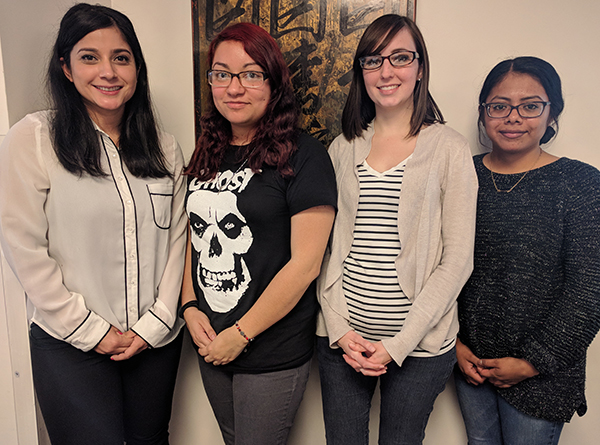
Organizing committee: Dr. William Arce, Shanell Contreras, Bryce Downing, Esmeralda Gamez, Dr. Chris Henson, Dr. Melanie Hernandez, Christina Legler, Dr. Samina Najmi, Guadalupe Remigio Ortega, Tara Williams
Keynote speakers: Reyna Grande and Gary Y. Okihiro
Organizing committee: Dr. William Arce, Mireyda Barraza Martinez, Jazmin Flores, Dr. Chris Henson, Dr. Melanie Hernandez, Dr. Samina Najmi, Guadalupe Remigio Ortega, Tara Williams
Keynote speakers: Wendy Rose and Arturo Arias
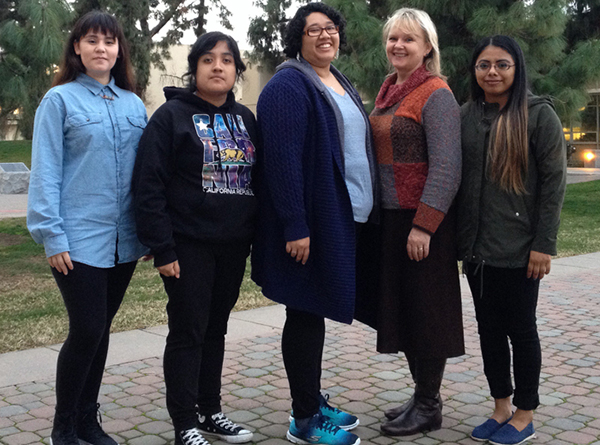
Organizing committee: Dr. William Arce, Mireyda Barraza Martinez, Emily Beals, Jazmin Flores, Dr. Chris Henson, Gloria Hernandez, Dr. Melanie Hernandez, Kyle Hoover, Dr. Samina Najmi, Guadalupe Remigio Ortega, Tara Williams
Keynote speakers: Saïd Sayrafiezadeh and Michele Elam
Organizing committee: Eryn Baldrica-Guy, Emily Beals, Jeremiah Henry, Dr. Chris Henson, Gloria Hernandez, Kyle Hoover, Prof. Randa Jarrar, Prof. Samina Najmi
Keynote speakers: Manuel Muñoz and Marilyn Chin
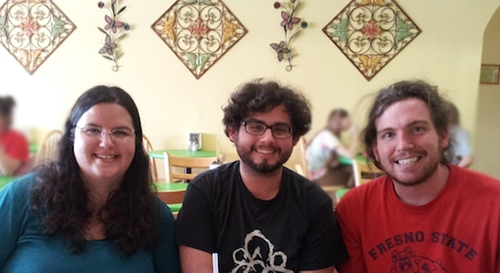
Organizing committee: Dr. Chris Henson, Cody Hoover, Dr. Samina Najmi, Shane Wood, Lena Zaghmouri
Keynote speaker: Roxane Gay
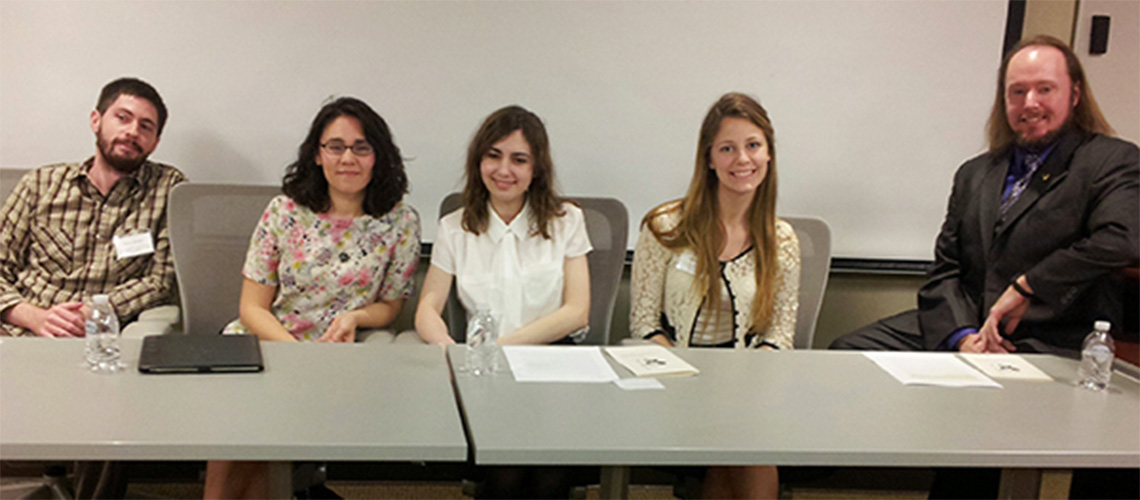
Organizing committee: Prof. Randa Jarrar, Dr. Samina Najmi, Lena Zaghmouri
Keynote speakers: Samiya Bashir and Patricia Engel
Organizing committee: Prof. Alex Espinoza, Gilliann Hensley, Dr. Analola Santana, Lena Zaghmouri
Keynote speakers: Hayan Charara and Jorge Huerta
Organizing committee: Erin L. Álvarez, Prof. Alex Espinoza, Miriam Fernandez, Dr. Kathleen Godfrey, Cynthia Guardado, Maryam Jamali Ashtiani, Dr. Samina Najmi, Mario Rosado, Dr. Analola Santana, Dr. Bo Wang
Keynote speaker: Cherríe Moraga
Organizing committee: Prof. Alex Espinoza, Maryam Jamali Ashtiani, Dr. Samina Najmi, Mario Rosado, Dr. Analola Santana
2025 Organizing Committee
Freddie Rosas
Jasmine Kaur
Joseph LeForge
Joshua Sagouspe
Isabella De La Torre
Hope Vang
Faculty Advisers
Dr. Sean A. Gordon
Dr. Melanie Hernandez
Prof. Melanie Kachadoorian
Dr. Samina Najmi
Dr. René Rodríguez-Astacio
Contact
UCMLA
Fresno State, Dept of English
5245 N. Backer Ave., PB98
Fresno, CA 93740-8001
559.278.2553
Peters Business Building
Room 382